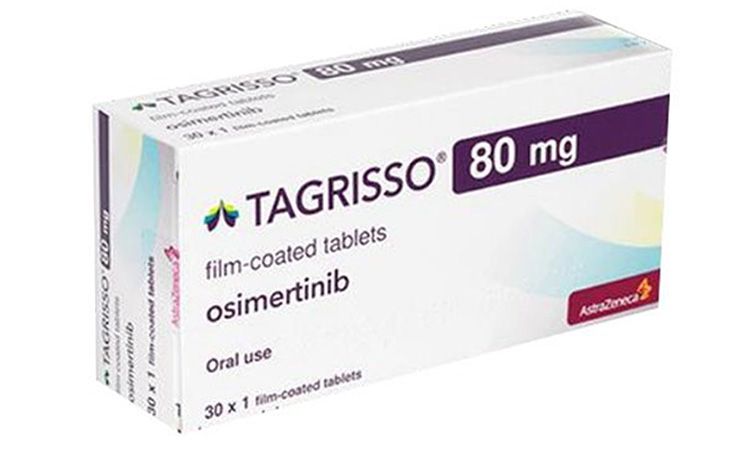A DAILY pill that doubles survival time for lung cancer patients will be made routinely available on the NHS.
Osimertinib, also known as Tagrisso and made by AstraZeneca, helps prevent cancer from returning after surgery when taken with chemotherapy.
It has been recommended by the National Institute for Health and Care Excellence (NICE) as an additional treatment for patients with EGFR mutation-positive non-small-cell lung cancer (NSCLC).
The EGFR protein controls cell growth, and its mutation is common in NSCLC, causing abnormal growth.
NICE says osimertinib targets EGFR-mutated cells to help prevent cancer from returning after surgery.
Osimertinib, first available through the Cancer Drugs Fund in January 2022, will now be routinely offered on the NHS.
Read more on lung cancer
It is estimated that about 600 people in England will benefit from the recommendation.
Helen Knight, director of medicines evaluation at Nice, said: "I am pleased we have been able to recommend that this targeted treatment for a specific gene mutation of lung cancer will be routinely available on the NHS.
"Previously the only treatment for people with this gene mutation of lung cancer where the tumour has been surgically removed was chemotherapy so I know patients will welcome this additional option."
Trials found the median disease-free survival time for patients on osimertinib was 65.8 months compared with 28.1 months for patients taking a placebo.
Most read in Health
Some 88 per cent of people on osimertinib also lived for five years compared to 78 per cent of people on the placebo.
Helen added: "At Nice, we are determined to constantly learn from data and implementation and the information gathered during this drug's time in the CDF and further clinical studies mean we can make this positive recommendation."
Lung cancer causes around 34,800 deaths annually in the UK, making up one in five cancer-related deaths.
That's roughly 95 deaths per day.
In the past 10 years, NICE has made 48 positive treatment recommendations for the disease, six times more than in the previous decade.
A patient’s story
Jules Fielder has been taking osimertinib since 2021.
She was diagnosed with stage four lung cancer in 2021 at the age of 37, despite not smoking or having the classic symptoms of the disease, such as a persistent cough.
"Lung cancer has no labels; it can happen to anybody at any age," Ms Fielder said.
"When I had my first scan after three months of being on osimertinib, the cancer had shrunk by 90 per cent in my lungs.
"And I have stayed stable since that day. And because they are tablets, we don't have to go to hospitals and be strapped to machines."
Other promising lung cancer treatments
- Scientists are working on creating tiny robots made from algae that could shrink lung cancer tumours and boost survival by 40 per cent
- Experts think lorlatinib could be the best lung cancer drug ever and say it could add years to the lives of patients dying from the disease
- A new vaccine, using the same tech as the Covid jab, trains the immune system to target tumour markers from non-small cell lung cancer
Dr Jesme Fox, medical director of , added: "Another misconception is that if you get lung cancer, there is no hope. That is not true at all.
"If we pick up lung cancer early, then surgery and radiotherapy are potentially curative. And we have seen many advances in the last 10 to 15 years, there are a lot more treatment options now than there used to be."
Read More on The Sun
Professor Peter Johnson, NHS England national clinical director for cancer, said: "It's great news this daily, life-extending pill is now routinely available as another treatment option for all patients in England with this type of lung cancer - secured at a cost-effective price for taxpayers.
"This drug offers the chance of precious additional years of life for hundreds of people following an operation for lung cancer with a specific gene mutation - and is just the latest example of cutting-edge, targeted cancer treatments to which the NHS has secured routine access too for patients."
WHAT IS LUNG CANCER?

LUNG cancer is the most deadly common cancer in the UK.
common cancer in the UK.
It is considered a common cancer alongside prostate, breast and bowel, which together make up more than half of all new cases.
Around 49,000 people are diagnosed with lung cancer every year and 35,000 die from it.
Just one in 10 patients survive for a decade or more after being diagnosed and lung tumours make up 21 per cent of cancer deaths in the UK but only 13 per cent of cases.
The main reason that it is so deadly is that symptoms are not obvious in the early stages.
When signs do appear they may include:
- A cough that lasts three weeks or more, and may hurt
- Repeated chest infections
- Coughing up blood
- Breathlessness
- Unusual tiredness
The NHS does not routinely screen for lung cancer but is rolling out more tests to smokers and ex-smokers at high risk, in a bid to catch it earlier. Testing may involve X-rays and chest CT scans.
Smoking is the number one risk factor for lung cancer and accounts for about 70 per cent of cases.
Risk may also be higher for people who have inhaled other fumes or toxic substances at work, such as asbestos, coal smoke or silica.
















